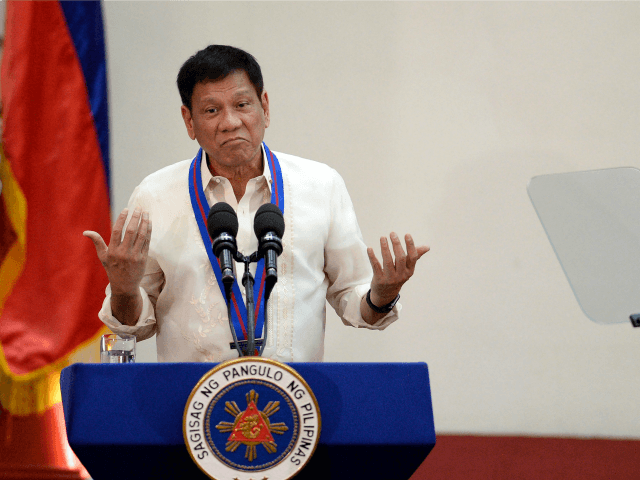Philippine President Rodrigo Duterte must receive his Chinese coronavirus vaccine in private because it will be administered “in the ass,” his spokesman told reporters on Tuesday.
When asked by CNN Philippines if Duterte’s stated decision to receive the coronavirus vaccine privately is final, presidential spokesman Harry Roque answered, “I think so. He has said so. As he said, because he is going to be injected in the ass, it cannot be done in public.”
Various government health officials in charge of the Philippines’ coronavirus vaccine campaign have pressured Duterte in recent weeks to receive a coronavirus vaccine in public to assure Filipinos of its safety and encourage participation. Duterte volunteered in August to be the first person to receive Russia’s Sputnik V coronavirus vaccine, then in development, adding that he would receive it “in public.” However, since the Philippine government secured coronavirus vaccine supplies from China’s state-run pharmaceutical company, Sinovac Biotech, on January 11, the president has said that healthcare workers will be prioritized for coronavirus vaccination and that government officials will be the last in line.
A number of Duterte’s presidential bodyguards were administered coronavirus vaccine candidates as early as October after early samples of the coronavirus vaccine developed by the Chinese company Sinopharm were allegedly smuggled into the Philippines from China. The incident is currently under investigation by the Philippine government.
At a January 19 press briefing, Roque said he asked Duterte the night before if he would receive one of the first coronavirus vaccines officially available in the Philippines, expected to arrive in February from China.
“His answer was, ‘No problem, I will take the vaccine as soon as it is available.’ But he said there is no need to show it to the public. He’s taking the route of the British sovereign, because it was Queen Elizabeth [II] and her husband [Prince Philip] who decided to receive [coronavirus] injections privately,” the presidential spokesman said.
When probed by a reporter about Duterte’s stated decision to receive a coronavirus vaccine in private rather than in public on January 21, Roque responded, “That’s his personal decision. I don’t think he has to explain.”
Philippine coronavirus vaccine czar Carlito Galvez Jr. admitted the government was grappling with low public confidence in the state’s upcoming vaccination drive in a meeting with Duterte on January 25, suggesting that Duterte’s support of the campaign would help encourage people to get vaccinated.
“This is our problem that we should all work on. We know that our … president, will be of great help because the willingness of our countrymen to get vaccinated is decreasing because of the adverse effects of certain brands,” Galvez told reporters during the televised meeting, according to the Manila Bulletin. “At the same time, the anti-vaxxers are getting strong on social media,” he added.
“A Pulse Asia survey recently showed that nearly half of Filipinos are not inclined to get the coronavirus vaccine supposedly due to safety concerns. At least 47 percent of the 2,400 survey respondents do not want to be vaccinated, 32 percent are willing to get the shot and 21 percent are undecided. Of those who refuse to get the vaccine, 84 percent claimed they were unsure about its safety,” the Manila Bulletin reported on January 26.
When asked by a reporter on January 26 how President Duterte would encourage the Philippine public to engage with the state’s anti-coronavirus campaign, Roque responded by saying that the president recently participated in a public service announcement encouraging Filipinos to follow coronavirus health protocols including wearing sanitary masks.
“We recognize the president is [the] best communicator for NTF [National Task Force against coronavirus] and our anti-COVID-19 [Chinese coronavirus] efforts,” Roque said.

COMMENTS
Please let us know if you're having issues with commenting.